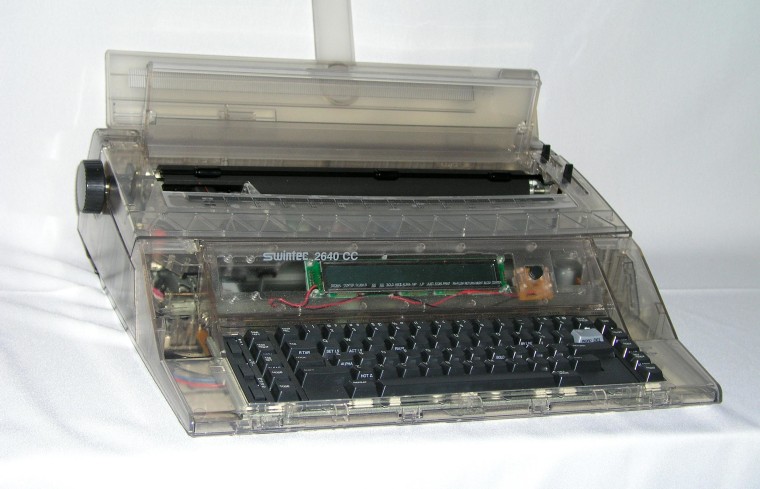Even in the cooler, Americans are hot for tech.
U.S. inmates are increasingly buying gizmos from prison commissaries, including MP3 players and flat-screen televisions -- spending about $750 million annually on their gadget habits as several companies quietly seize this massive, captive audience and take niche marketing to an entirely different place.
Sign up for top Technology news delivered direct to your inbox.
Appliances built for purchase at most prisons do, however, carry one (literally) clear distinction: They are encased in transparent plastic, allowing guards to routinely inspect them for drugs, weapons or other contraband.
“There are 2 million-plus inmates incarcerated in America at this time. We haven’t tapped every one of them. But we’ve seen more sales every year,” said Ed Michael, general manager of Swintec, a New Jersey company that has, since 2003, offered electronic typewriters to inmates.
Swintec has boosted its manufacturing numbers to as many as 5,000 machines per year and now does business with prisons in 46 states, including Sing Sing Correctional Facility in New York, U.S. Penitentiary Leavenworth in Kansas, and San Quentin Prison in California, Michael said. The company’s highest-end typewriters contain enough memory to store 50 pages of text, turning them into functioning word processors –- without the Internet access. Prices range from $192 to $748.
“We don’t foresee an end to this,” Michael said.
The catalog of corrections-approved electronics also spans big brands such as Sony and Casio with items like headphones, radios, and 15-inch flat-screen TVs, all modified to be “prison safe” –- that is, “see through” and sealed with “security screws,” according to the website for Union Supply Direct, one of the few players in this little-known market. That company is based in Rancho Dominguez, California.
Then there is Keefe Group, which has offices in 10 cities and dubs itself “the nation’s leading supplier” of prison-ready products and electronics, including televisions, typewriters, CD players, portable radios, fans, and clocks.
But don’t expect Keefe Group to talk up its wares, prices or the popularity of its items. Citing security concerns among its clients –- prison administrators –- the company prefers to stay out of the media, said spokesman Paul Scherer.
This year, U.S. prisoners will purchase an estimated $750 million in clear electronics, according to Lucas Isakowitz, an industry analyst at IBISWorld, a market research organizaiton. That figure only includes the sale of goods inside prisons
"The prison electronics market will likely become larger in the coming years as states are allowing prisoners access to more electronics such as electronic tablets," Isakowitz said. He cited seven states (Ohio, North Dakota, Georgia, Louisiana, Virginia, Michigan and Washington) that let prisoners purchase mini-tablet computers.
While some people on the outside might disagree with giving inmates any access to tech toys, Swintec's Michael contends the burgeoning market is helping incarcerated convicts better themselves.
“They give inmates something good to do on a daily basis,” said Swintec's Michael, “rather than sit there and be idle, thinking about what else they can do next.”

One of the most famous owners of a Swintec typewriter, according to company officials, was Stanley Tookie Williams, an ex-Los Angeles gang member. While imprisoned for four murder convictions, Williams wrote a series of anti-violence books. In 2005, he was executed for his crimes by the State of California.
But among those who lauded Williams’ writing was Archbishop Desmond Tutu.
Another book crafted behind bars, also tapped out on a Swintec, will be published later this year.
“Narcotica,” a novel by Daniel Genis, offers an alternate version of the world had illicit drugs, not alcohol, become the legal and socially accepted inebriant of choice. Before his 10-year incarceration at several New York State prisons, Genis had been addicted to heroin. His crimes involved drugs. When he began his sentence in 2004, he said, he was sober.
“I wrote the book in solitary confinement. They give you five pieces of paper a week in there. So the book was written (with a pen) on my five pieces of paper, my bunky’s five pieces of paper, plus pieces of cardboard, and on the backs of official forms. In ‘the box,’ all I did was write,” Genis said. “When I brought all those papers out, it just looked like a horrible mess. And as soon as I finished my time in solitary, I typed it up on the typewriter,” said Genis, 35, who lives in Brooklyn.
When it comes to modern prison electronics, the old-fashioned typewriter can still crank up a potent profit, Genis said. Some inmates use them, not for writing, but to run gambling operations -- typing up hundreds of tiny betting stubs to pass among incarcerated sports wagerers. Other inmates use them to complete legal work in their cells.
“Now, there is a great perk to that,” Genis said. “Theoretically, you’re not allowed to do the legal work of other people. But, of course, this happens every day. So, for jailhouse lawyers, the typewriter becomes a tool for earning money, an investment tool.
“They earn their couple hundred bucks for every legal brief they write, and the typewriter pays for itself.”
But in black market of a prison, those legal bills aren’t paid in cash.
“Let's say it's a $100 habeas corpus (document). That’s paid off in packs of cigarettes -– or by Western Union, where somebody on the street pays real money into somebody else’s account,” Genis said.
The tapping heard on electronic typewriters in prison may mean income for some inmates. But what they typically don’t signal, Genis said, is trouble.
“Nobody ever takes apart a typewriter to make a weapon because the thing is just too expensive,” Genis said. “And the kind of people who have typewriters are not the kind of people who need weapons.”